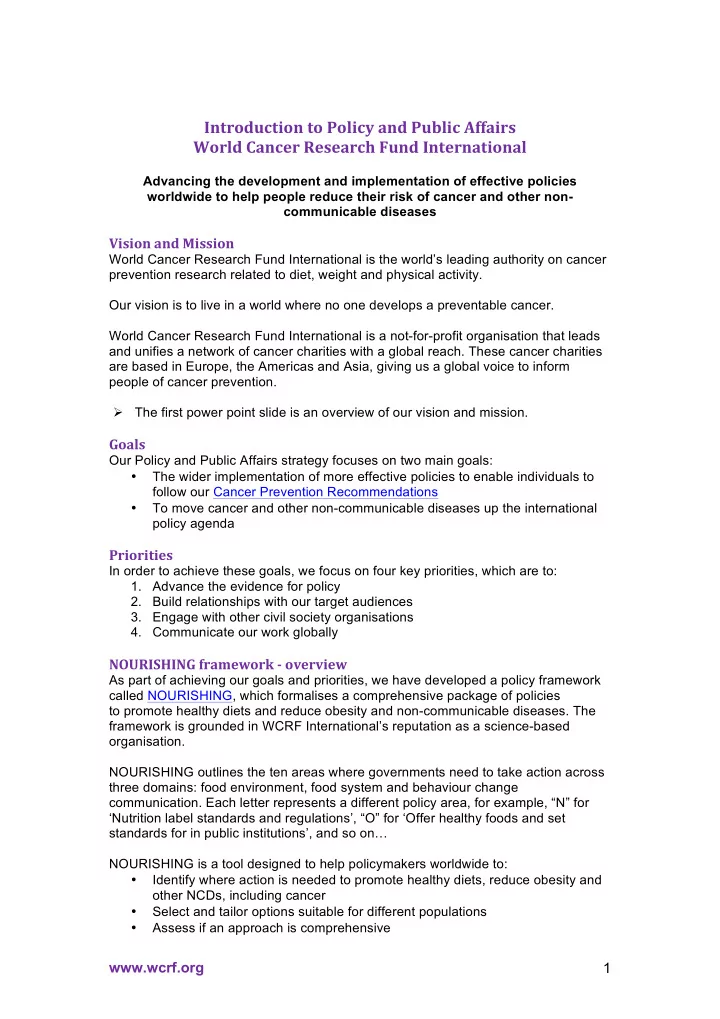

Introduction to Policy and Public Affairs World Cancer Research Fund International Advancing the development and implementation of effective policies worldwide to help people reduce their risk of cancer and other non- communicable diseases Vision and Mission World Cancer Research Fund International is the world’s leading authority on cancer prevention research related to diet, weight and physical activity. Our vision is to live in a world where no one develops a preventable cancer. World Cancer Research Fund International is a not-for-profit organisation that leads and unifies a network of cancer charities with a global reach. These cancer charities are based in Europe, the Americas and Asia, giving us a global voice to inform people of cancer prevention. Ø The first power point slide is an overview of our vision and mission. Goals Our Policy and Public Affairs strategy focuses on two main goals: The wider implementation of more effective policies to enable individuals to • follow our Cancer Prevention Recommendations To move cancer and other non-communicable diseases up the international • policy agenda Priorities In order to achieve these goals, we focus on four key priorities, which are to: 1. Advance the evidence for policy 2. Build relationships with our target audiences 3. Engage with other civil society organisations 4. Communicate our work globally NOURISHING framework - overview As part of achieving our goals and priorities, we have developed a policy framework called NOURISHING, which formalises a comprehensive package of policies to promote healthy diets and reduce obesity and non-communicable diseases. The framework is grounded in WCRF International’s reputation as a science-based organisation. NOURISHING outlines the ten areas where governments need to take action across three domains: food environment, food system and behaviour change communication. Each letter represents a different policy area, for example, “N” for ‘Nutrition label standards and regulations’, “O” for ‘Offer healthy foods and set standards for in public institutions’, and so on … NOURISHING is a tool designed to help policymakers worldwide to: Identify where action is needed to promote healthy diets, reduce obesity and • other NCDs, including cancer Select and tailor options suitable for different populations • Assess if an approach is comprehensive • www.wcrf.org 1
In addition, NOURISHING supports civil society organisations to monitor what governments are doing around the world, benchmark progress and hold them to account. Researchers can use NOURISHING to identify the evidence available for different policies, identify research gaps and use it as a resource for policy monitoring and evaluation. Ø The second power point slide provides an overview of the ten policy areas within NOURISHING framework. Ø The third slide provides an overview of the aims and target audiences of the NOURISHING framework. The NOURISHING Policy Database Accompanying the framework is our NOURISHING policy database: this provides a regularly updated list of policy actions that are implemented around the world. The database currently includes 360 implemented government actions across 126 countries. To receive regular updates about NOURISHING and policies being implemented globally, email policy@wcrf.org. Ø The fourth slide shows the depth of information provided in the policy database – examples of policy actions are given for each policy area (letter) in NOURISHING, including specific examples of where the policy is implemented and further details about the policy itself. Policy Briefs We also produce policy briefs to give an overview of robust policy actions being taken worldwide, supported by evidence to promote healthy diets and reduce obesity. Our food policy highlights brief outlines a small number of food policy actions, chosen because they: • have already been, or begun to be, implemented; • have a relatively robust design and potential for impact; • are supported by evidence indicating they can lead to healthier diets; • can be tailored for application in other countries. Our brief on SMART commitments to address NCDs, overweight & obesity illustrates how recommendations in the Second International Conference on Nutrition (ICN2) Framework for Action can be translated into policy commitments which are SMART (Specific, Measurable, Achievable, Relevant and Time-bound), and is accompanied by case studies. Our sugar policy brief provides a guide to effective and feasible policies, drawn from NOURISHING, that can assist countries in reducing the amount of sugar consumed at population level to meet the new WHO sugar guideline. The brief gives examples of policies that effectively influence the 4 A’s of sugar consumption: availability, affordability, acceptability and awareness, and includes input from those involved in the development and implementation of these policies. Ø The fifth slide shows three of our policy briefs – Curbing Global Sugar Consumption, SMART commitments to address NCDs, overweight & obesity, and Food Policy Highlights from Around the World. www.wcrf.org 2
Vision and Mission World Cancer Research Fund International is the world’s leading authority on cancer prevention research related to diet, weight and physical activity. Our vision is to live in a world where no one develops a preventable cancer. World Cancer Research Fund International is a not-for-profit organisation that leads and unifies a network of cancer charities with a global reach. These cancer charities are based in Europe, the Americas and Asia, giving us a global voice to inform people of cancer prevention.
NOURISHING framework www.wcrf.org/NOURISHING
NOURISHING framework Aim : formalise a comprehensive package of policies to promote healthy diets and reduce obesity and non-communicable diseases (NCDs) For: • Policymakers - To identify where action is needed to promote healthy diets - Select and tailor options suitable to different populations - Assess if an approach is sufficiently comprehensive • Researchers - To identify the evidence available for different policies, identify research gaps and as a resource for policy monitoring and evaluation • Civil society organisations - To monitor what governments are doing around the world, benchmark progress and hold them to account
NOURISHING policy database 360 implemented policies across 126 countries
Recent policy briefs 2014 2016 2015
Recommend
More recommend